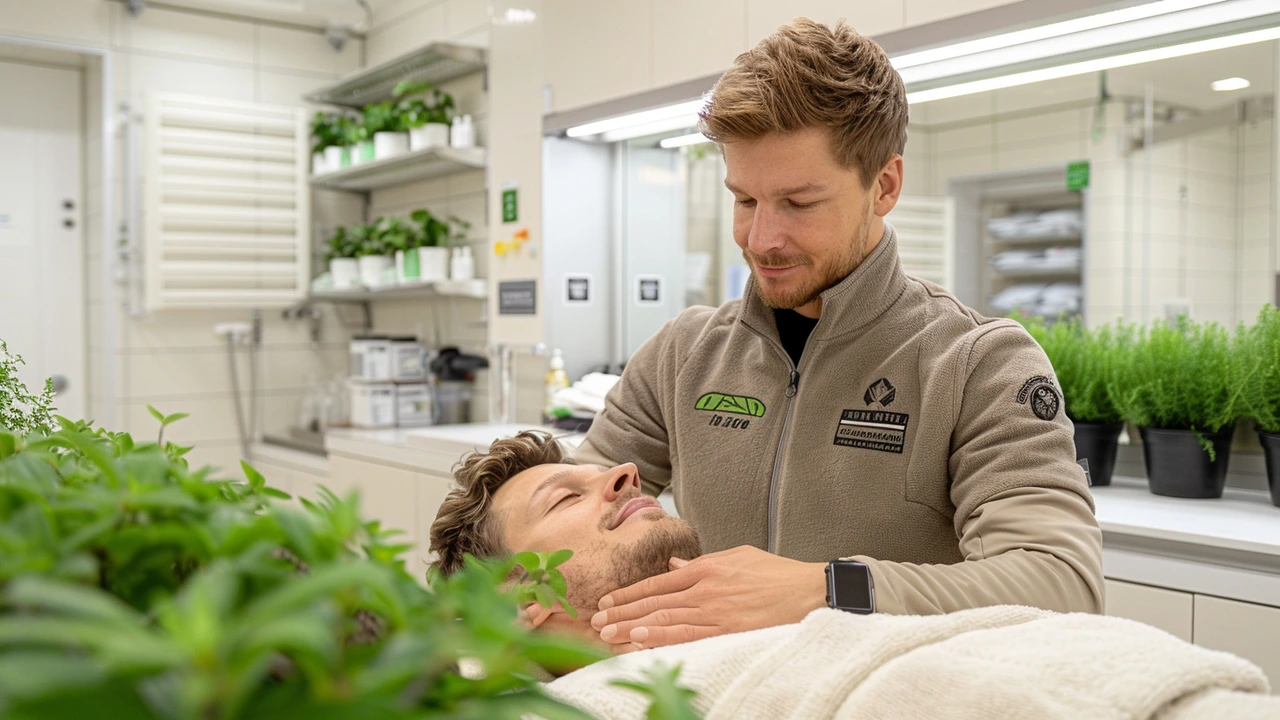Gay Massage: Exploring Holistic Healing through Therapeutic Touch

- May, 28 2024
- 0 Comments
- Tabitha Moorehead
Gay massage offers a unique pathway to holistic healing, focusing on the therapeutic touch designed to meet the specific needs of the LGBTQ+ community. The practice not only addresses physical ailments but also nurtures the mind and soul.
Historically, massage therapy has been embraced for its ability to relieve stress, alleviate pain, and improve overall well-being. Gay massage takes it a step further by creating a safe and affirming space where individuals can experience comfort and healing without fear of judgment.
Diving deeper into the practice reveals a blend of traditional techniques with a sensitivity to the unique emotional and social experiences of LGBTQ+ individuals. This specialized approach can help address issues like muscle tension, chronic pain, and emotional trauma.
For those new to gay massage and seeking the right therapist, it's essential to look for professionals who demonstrate understanding and respect for LGBTQ+ issues. Consider checking their credentials, seeking recommendations, and having an open conversation about your needs to ensure a beneficial experience.
- Introduction to Gay Massage
- Physical Benefits
- Emotional and Mental Healing
- Tips for Finding a Qualified Therapist
Introduction to Gay Massage
Gay massage is not just a trend; it’s a deeply ingrained practice within the LGBTQ+ community that offers both healing and comfort. Born out of the need for a safe and accepting environment, gay massage allows clients to experience therapeutic touch tailored to their unique requirements. Traditional massage therapies often neglect the specific emotional and physical nuances that LGBTQ+ individuals may face, making this specialized service all the more essential.
The origins of gay massage can be traced back to ancient cultures where same-sex rituals and healing practices were part of communal life. Today, it embodies a modern approach rooted in understanding and compassion. The practice combines various techniques such as Swedish, deep tissue, and aromatherapy, each adapted to provide maximum benefit for the client's physical and emotional well-being.
What sets gay massage apart is its emphasis on creating a space free from judgment and full of respect. It goes beyond the physical to address mental and emotional healing. Issues like anxiety, depression, and past traumas can be more effectively managed when the therapist is attuned to the client's lived experiences.
As noted by the American Psychological Association, “LGBTQ+ individuals often face unique stressors that can significantly impact their mental health.” This underscores the importance of holistic health practices like gay massage, which are designed to cater specifically to this community's needs. When engaging in gay massage, the goal is to provide a therapeutic touch that fosters a connection beyond the surface level.
Therapists who specialize in gay massage are usually well-versed in the socio-emotional landscapes of their clients. They create tailored sessions that consider not just muscle tension but also emotional wellbeing. A typical session might integrate relaxation techniques to calm the mind, combined with deeper pressure to alleviate chronic muscle pain. The balance of these elements ensures a comprehensive healing experience.
To maximize the benefits of gay massage, it's essential to find a qualified therapist. Researching online reviews, seeking recommendations from trusted sources, and having an open dialogue with potential therapists about their experience and approach can make a significant difference. Always ensure that a therapist is certified and has a track record of working with LGBTQ+ clients.
Gay massage is more than a therapeutic practice; it's a movement towards inclusive wellness. By accounting for the unique needs of LGBTQ+ individuals, it fosters a sense of belonging and acceptance that is often missing in conventional therapeutic settings. This offers a holistic healing journey where the body, mind, and spirit are harmonized within a framework of understanding and care.

Physical Benefits
Gay massage, much like other forms of therapeutic massage, offers a myriad of physical benefits that contribute to overall wellness. The practice employs a variety of techniques, including deep tissue massage, Swedish massage, and trigger point therapy, which work synergistically to alleviate muscle tension and pain. One of the key advantages is its ability to enhance blood circulation. Improved circulation helps deliver oxygen and essential nutrients to muscles and tissues, aiding in the recovery process and promoting healthy cell function.
Additionally, regular massage therapy can significantly reduce the levels of cortisol, the body’s primary stress hormone. Elevated cortisol levels can lead to numerous health problems, including weight gain, sleep issues, and weakened immune function. By helping to lower stress, gay massage supports the body’s natural ability to heal and maintain balance. This reduction in stress is particularly beneficial for LGBTQ+ individuals who may experience higher levels of anxiety and stress due to societal pressures and discrimination.
Massage therapy also stimulates the lymphatic system, which is crucial for maintaining a healthy immune system. The gentle pressure applied during massage helps to increase lymphatic flow, removing toxins and waste products from the body more efficiently. This detoxifying effect can lead to better skin health, fewer illnesses, and an overall sense of vitality.
Furthermore, regular massage sessions can improve flexibility and range of motion. By addressing tight muscles and connective tissues, massage helps to maintain and enhance joint mobility. This is especially beneficial for those who engage in physical activities, as it can prevent injuries and improve athletic performance. For many, the increased flexibility and reduced muscle stiffness translate to a more active and enjoyable lifestyle.
According to the American Massage Therapy Association, “Regular massage is proven to relieve muscle tension, improve flexibility, and enhance overall physical function.”AdditionaLast but not least, gay massage can be a profound remedy for chronic pain conditions. Individuals suffering from ailments such as fibromyalgia, arthritis, or back pain often find significant relief through targeted massage therapy. The personalized approach of gay massage ensures that specific issues are addressed with the appropriate techniques, maximizing the therapeutic benefits.
The physical benefits of gay massage go beyond the immediate relief of tension and pain. By fostering a deep sense of relaxation and well-being, it contributes to the body's long-term health and resilience. Whether it’s boosting your immune system, increasing flexibility, or simply providing a safe space to unwind, gay massage can be a vital part of a holistic wellness routine.

Emotional and Mental Healing
Gay massage offers significant benefits that go beyond physical relief. It plays a crucial role in emotional and mental healing, especially for individuals who may have faced discrimination, rejection, or emotional trauma. In an inclusive and compassionate environment, the healing touch of a qualified therapist can work wonders in uplifting the spirit and mind.
One key aspect of gay massage is the creation of a safe space where clients feel accepted and understood. This is particularly important for LGBTQ+ individuals who often carry a burden of societal judgment. The therapist's touch serves as a form of non-verbal communication, conveying a message of acceptance and care. This can significantly alleviate feelings of loneliness and isolation.
The practice also helps in releasing emotional tension stored within the body. Chronic stress, past traumas, and anxieties can manifest as physical tension. Through targeted techniques, a skilled therapist can help release these built-up tensions, leading to a profound sense of relief. As the body relaxes, the mind follows, promoting a balanced and harmonious state of being.
Studies have shown that therapeutic touch can trigger the release of oxytocin, often referred to as the 'love hormone'. Oxytocin not only fosters a sense of bonding and trust but also reduces levels of cortisol, the stress hormone. This hormonal balance is essential for maintaining mental health, reducing anxiety, and promoting a positive outlook on life.
"Massage therapy can be an essential part of emotional healing, especially for those recovering from trauma and seeking to rebuild a sense of safety and self-worth," says Dr. Jane Smith, a renowned therapist and author.
Gay massage also encourages mindfulness and self-awareness. During a session, clients are often guided to focus on their breathing and bodily sensations, which helps in cultivating a mindful state. This practice of mindfulness not only enhances the massage experience but can also be carried into daily life, improving overall mental well-being.
It is important to recognize the power of touch in healing emotional wounds. Many LGBTQ+ individuals have experienced touch as a means of harm or rejection. Reframing touch within a positive and nurturing context can be a transformative experience, helping individuals reconnect with their bodies and emotions in a healthy manner. This kind of therapy often leads to a more grounded sense of self and a greater capacity for resilience.
For those considering gay massage, it is helpful to communicate openly with the therapist about any emotional and mental health concerns. A good therapist will tailor their approach to meet the client's specific needs, ensuring that the therapy not only addresses physical discomfort but also nurtures the soul. It’s a journey towards wholeness, one session at a time, fostering a balanced integration of body, mind, and spirit.

Tips for Finding a Qualified Therapist
Finding the right therapist for a gay massage can be a transformative step in your journey to holistic healing. It requires a bit of research and intuition to ensure you connect with someone who truly understands your needs. First, start by seeking recommendations from friends or community members who have had positive experiences. Word of mouth can often provide valuable insights into a therapist’s approach and professionalism.
It’s also worthwhile to explore online directories and websites dedicated to LGBTQ+ health and wellness. These platforms often have listings and reviews of therapists who specialize in working with LGBTQ+ clients. Make sure to look at credentials and read client testimonials. They can give you a sense of the therapist’s expertise and their sensitivity to LGBTQ+ issues. Google reviews and platforms like Yelp can also be helpful in gauging the reputation of a massage therapist. Remember, a good recommendation from the community can be much more reliable than a generic review.
When you’ve narrowed down your options, schedule a consultation or initial meeting. This is your opportunity to ask questions and get a feel for whether the therapist is a good fit. Inquire about their experience specifically with gay massage and how they approach creating a safe and inclusive environment. A professional therapist will be more than willing to discuss their methods and philosophy with you.
"A therapist's ability to create a safe and affirming space is crucial for the healing process," notes Dr. Michael Kauth, a psychologist and expert in LGBTQ+ health.
It’s also essential to verify the therapist’s qualifications. Ensure they are licensed and have received formal training from accredited institutions. Professional associations, such as the American Massage Therapy Association (AMTA), can be a resource for finding licensed practitioners who adhere to high standards of practice. Additionally, consider whether they are certified in specific techniques that align with your needs, such as deep tissue or trigger point therapy.
Don’t underestimate the power of your instincts during this process. If you feel uncomfortable or unsure about a therapist, it’s okay to keep looking. Trust and comfort are paramount in such intimate and personal therapy settings. The right therapist should make you feel respected, understood, and at ease.
Remember, ongoing communication is crucial. Once you start sessions, provide feedback about what is working for you and what isn’t. A skilled therapist will welcome your input and adjust their techniques accordingly to best meet your needs.